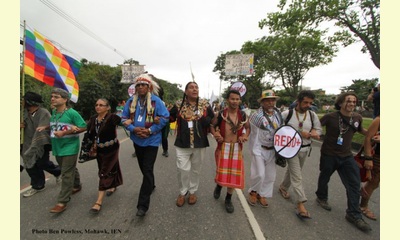|
|
Kari-Oca II Declaration: Indigenous Peoples at Rio +20 reject the Green Economy and REDD
un article par Chris Lang, REDD Monitor
In 1992, while the first Rio Earth Summit took place, hundreds of indigenous peoples met and produced the Kari-Oca Declaration and the Indigenous Peoples Earth Charter. 20 years later, in parallel with Rio +20 meeting, more than five hundred indigenous peoples met and produced the Kari-Oca II Declaration.

Photo by Mohawk Ben Powless, who works with the Indigenous Environmental Network
click on photo to enlarge
The words “Kari-Oca” mean “white man’s house” in the Tupí-Guaraní language. That’s what the indigenous people living in what is now Rio de Janeiro called the first settlements of Portuguese colonists.
The Kari-Oca II declaration rejects the “Green Economy”: The “Green Economy” promises to eradicate poverty but in fact will only favor and respond to multinational enterprises and capitalism. It is a continuation of a global economy based upon fossil fuels, the destruction of the environment by exploiting nature through extractive industries such as mining, oil exploration and production, intensive mono-culture agriculture, and other capitalist investments.
The declaration also rejects REDD (Reduced Emissions from Deforestation and forest Degradation) as one of many false solutions to climate change. The declaration demands that the UN abandon these false solutions: We demand that the United Nations, governments and corporations abandon false solutions to climate change, like large hydroelectric dams, genetically modified organisms including GMO trees, plantations, agro-fuels, “clean” coal, nuclear power, natural gas, hydraulic fracturing, nanotechnology, synthetic biology, bio-energy, biomass, biochar, geo-engineering, carbon markets, Clean Development Mechanism and REDD+ that endanger the future and life as we know it.
The 1992, Kari-Oca meeting played an important part in the development of an international movement for Indigenous Peoples’ rights and in the recognition of the role that Indigenous Peoples play in conserving their environment. But many of the agreements from 20 years ago have been ignored by the world’s governments. For example, the 1992 Indigenous Peoples Earth Charter includes the following: We urge governments to ratify International Labour Organisation (ILO) Convention 169 to guarantee an international legal instrument for Indigenous Peoples. At the time only four countries had ratified ILO 169 (Bolivia, Colombia, Mexico and Norway). Twenty years later, that figure has increased, but only to 22 countries.
The Kari-Oca II Declaration is an important document, as Windel Bolinget, of the Igorot people in the Philippines explains, “The Kari-Oca II declaration is not just a paper. It is a sacred document that encompasses our struggles worldwide. It makes clear that we will walk the path of our ancestors.”
Both the Kari-Oca II Declaration of 2012 and the Kari-Oca Declaration of 1992 are posted in the discussionboard.
|








|
DISCUSSION
Question(s) liée(s) à cet article:
Text of the Kari-Oca Declaration of 1992,
The understanding of indigenous peoples, Can it help us cultivate a culture of peace?
* * * * *
Commentaire le plus récent:
Two articles in recent years in CPNN point to the renewed recognition of the importance of indigenous knowledge and traditions to help save us from the ecological disaster of the global industrialized economy.
In the article preparing for the upcoming People's Summit in Rio (See CPNN April 12, 2012), Fabiola Ortiz emphasizes the importance of involving indigenous peoples in the decision-making about development projects.
The indigenous peoples of the Amazon made this argument very dramatically and eloquently in person at the World Social Forum in Belem, Brazil, as described the CPNN article of February 6, 2009.

|
|









